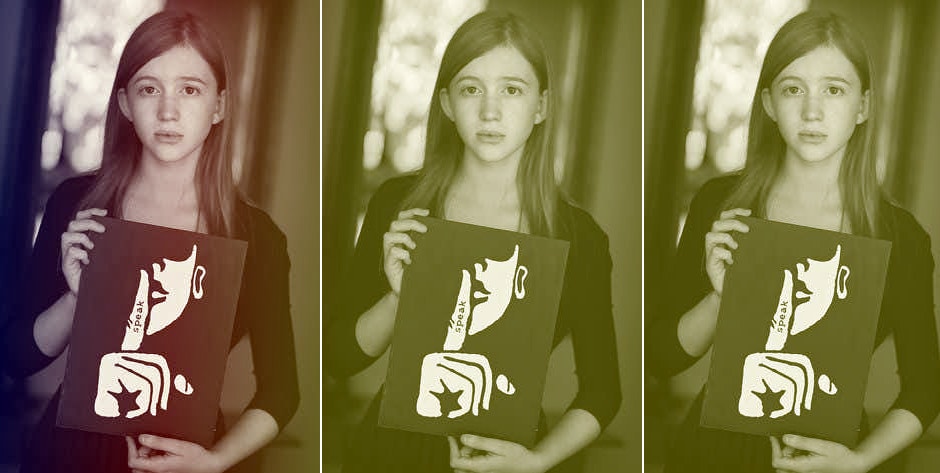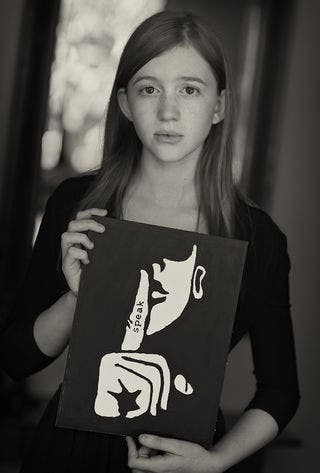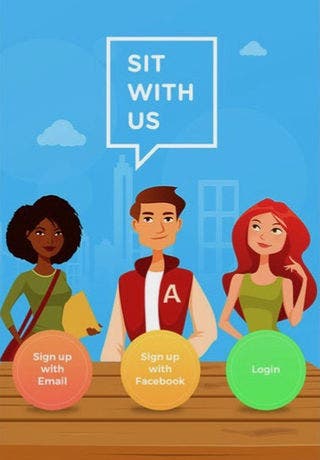Meet The Teen Who Discovered The Secret Of Social Capital
Natalie Hampton turns the (lunch) tables on a social system that breeds bullies.

“You're worthless. You should kill yourself. Everyone would be happier if you did.”
This is not someone’s depressed inner voice. This is what real children tell other real children in middle school.
How should the target of this kind of comment react when learning how to deal with bullying? Punch them? Explain that those words are unkind? Tell a teacher? Say, “How about you give it a try and tell me how it goes”? What if the comments don’t go that far? What if those kids just say, “You’ll never have any friends”?
New to her school, and knowing no one, Natalie Hampton started seventh grade expecting to make new friends. She was friendly and made an effort, but as she told me, “everyone already had friends and they weren’t looking for any more.”
She knew that sitting alone at lunch would mark her as a social outcast, but when she tried to join other tables, “you can’t sit with us” was the refrain. Before long, Natalie faced persistent exclusion, name-calling, taunting, threats, and “pranks.”
With no friends, by 8th grade, she was isolated and lonely. “You’ll never have any friends,” kids taunted her.

Photo: Natalie Hampton
The school administration was convinced Natalie was doing something to cause other kids to dislike her, and was certain she was exaggerating how she was being treated. Twice a week, Natalie dutifully met with the school counselor who interrogated her, trying to identify what was wrong with her and how she was causing her social problems.
The administration’s perception of Natalie resulted in adults at the school interpreting everything she did in the least generous way possible. With no support or protection from adults, bullies understood they had tacit approval to target her, and the social aggression became physical.
Natalie developed anxiety. Whenever she entered a classroom, she planned her escape route. She suffered from chronic headaches, stomachaches, and nightmares. She began to believe that everyone at school was right; there had to be something wrong with her. She would never have friends.
“When a lot of adults in your life are telling you that it’s your fault,” she told me, “you start to internalize it.” She lost hope that her life would get better, that she would even live to graduate high school.
Children and teens need friends. Friends aren’t just the “icing on the cake.” Friends aren’t even the cake. Friends are the vegetables. Having friends is socially and emotionally protective. Being told “you’ll never have any friends” can easily be shrugged off by a child who has friends, and a friend might even step in to prove it wrong.
But for a socially isolated child, there is no one to demonstrate that it isn't true; and that can feel like a death sentence. Without the social protection that children provide for their friends, a child without friends is an easy target; and a useful one.
Unkind behavior toward children without social status is rewarded with social capital and elevated social status because it highlights the status differential. Calling attention to this difference in status results in a depletion of social capital and a lowering of social status for the target of that unkindness, who has no one to intervene.
Defending a low-status child is like touching someone with “cooties,” so bystanders rarely step in. In contrast, allying with socially aggressive, high status children earns social capital without risking any — with no one to defend their low-status targets, there are no negative consequences for bystanders who laugh or join in. Even when they do nothing, bystanders encourage aggression because doing nothing further proves that the target has no one on their side.
As a result, a child at the bottom of the social ladder becomes “untouchable.” Even if that child has a delightful personality and loads of friends elsewhere, in a social system in which she lacks social capital, she is not likely to acquire friends.
Befriending an untouchable doesn't earn the higher status child any social capital, and the idea is so overwhelmingly unattractive that it is generally not even considered. Science writer Amy Alkon coined the term “social greed” to describe the unwillingness to risk social capital without an anticipated return on investment.
Children with status erroneously believe that the reason untouchables have no social status is because they are repulsive, but in truth, it is precisely the reverse. The lack of social status is what makes an untouchable appear repulsive. This is why the single most effective peer intervention for eliminating bullying is for children to befriend those who are targets. But out of fear that associating with an untouchable could result in their own fall down the social ladder, children manufacture reasons to dislike low-status children, and justify their refusal to spend social capital to help them.
This childhood game of social status plays out in adulthood. When Harvey Weinstein had power and status, everyone was “afraid to say anything about him other than "Thank you, thank you, Harvey,” says Peter Biskind, who wrote a book about the film industry. After the public revelations about Weinstein, director Quentin Tarantino admitted, “I knew enough to do more than I did.” Instead, however, he benefited for years from being associated with Weinstein, who is described as having been Tarantino’s “greatest champion.”
Tarantino is not alone in choosing not to spend social capital to defend those without much status. Going against someone at the top of the status hierarchy is risky. In those situations, although people may want to speak out, stand up, or fight back, they are often counseled not to. It rarely seems like a good idea. Even someone with as much status as Jane Fonda, although she knew, “didn't feel that it was [her] place.”
Parents teach this kind of thinking early. They tell their children to “walk away” when they see a child being mean to another child. “Don’t fight other people’s battles,” they advise. “Avoid the drama” they say. As a rule, we don't teach children to tend, defend, and befriend those without social status, to spend social capital on them.
While some mothers I’ve asked believe in bystander intervention in theory, in practice, no parent has ever told me that they actively encourage their children to stand up for or befriend socially isolated children. One mother of an especially high-status child (a “popular” girl) told me that while it’s not okay with her for her daughter to be “unkind” to anyone, she doesn’t believe in telling her daughter to befriend bullied children because she feels strongly that her daughter has the right to choose her own friends without parental interference.
After two years of hell at school and four separate physical attacks, Natalie Hampton finally escaped the school where no one defended her. Today, she's a vibrant, happy senior in high school. She has lots of friends, and she looks forward to graduation.
Her transformation began on her first day of high school, when, just like before, Natalie didn’t know anyone. This time, however, another student, seeing that she looked lost, befriended her. “It saved my life,” Natalie reveals in her TEDxTeen talk.

Photo: Natalie Hampton
All it took was one person. With one friend, she was no longer untouchable. She could make other friends — and she did. For two years, Natalie Hampton ate lunch alone. So after she changed schools, whenever she saw someone eating lunch alone, she would invite them to join her friends at their table. She knew that by saying “sit with us,” she protected other children from becoming untouchable.
“Each time, the person’s face would light up, and the look of relief would wash over,” she says. “Some of those people have become some of my closest friends.” Natalie was willing to give up her social capital, but she discovered that when a person has friends, spending social capital by befriending those without it lifts people up without bringing anyone down. If “sit with us” became the ethos in middle school, bullying would be a thing of the past.
Today, Natalie is famous for having created Sit With Us, the phone-based anti-bullying app that helps kids find a welcoming place to eat in their school cafeteria.

It’s her way to encourage other children to befriend kids who don’t have social support at school. She has been profiled in Seventeen Magazine, Teen Vogue, and the Washington Post; interviewed by NPR; won multiple awards; named one of “25 Women Changing the World” by People Magazine, and she was honored with the Outstanding Youth Delegate Award at the United Nations Youth Assembly.
When Natalie invited to her lunch table a girl who would later become one of her best friends, she had no way of knowing that until that day, that girl had felt so lonely and hopeless that she had contemplated suicide. Being welcomed into a group of friends saved her life.
All it takes is one person to make a world of difference.
Dr. Pamela Paresky is the author of the guided journal, A Year of Kindness. She serves as Director of the Aspen Center for Human Development and is Chief Research Officer to the President and CEO of the Foundation for Individual Rights in Education.
YourTango may earn an affiliate commission if you buy something through links featured in this article.

